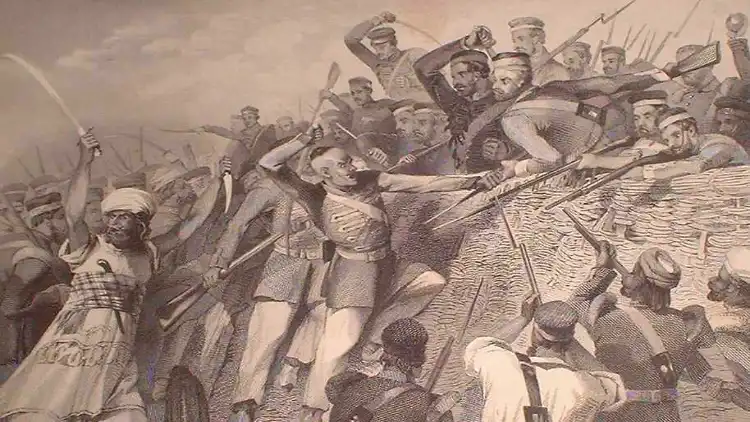
Saquib Salim
“History is written by victors,” is an old saying amongst the British. It reflects the psyche of the British. In the Eastern civilizations we do remember the people who did not win but fought for truth and justice.
In fact, for a historian it is always easier to write about the victors. He faces a challenge while writing about the tricky situations like the national war of independence of 1857. After the English defeated the Indians, the revenge was violent. They razed houses burnt villages and destroyed the belongings to the rivals. How will we find any evidence when everything belonging to them was destroyed?
Whatever little mention we find is through the British records that have the national war of independence as ‘mutiny’ and Indian revolutionaries as ‘traitors’. However, a man can be killed not the truth. The tales of valour of the Indian revolutionaries lived through oral traditions, and some brave writers.
Haji Imdadullah Muhajir Makki was one such great warrior of 1857 whose name was erased from the colonial records for the fear that it would evoke the nationalist feelings among the Indians. Imadadullah was born in small town Nanauta in Saharanpur, Uttar Pradesh, in 1818. He was hugely interested in theology and sociology. In 1845, he went to Saudi Arabia for Haj and stayed there to study Islam.
Shah Muhammad Ishaq, who was already living in Makkah at the time, told Imdadullah to return to India and continue the work started by Shah Waliullah (1703 - 1762) and Shah Abdul Aziz (1746-1824). Waliullah had envisaged a concept of all an embracing revolution. Waliullah, after looking at the growing political power of the British, once wrote, “The conditions of India are not hidden as India is my motherland.”
The idea of freedom of India from the British was well articulated by him among his disciples after his return to India in 1846. Imdadullah started preaching his ideas from Thana Bhavan in Muzaffarnagar. Hafiz Muhammad Zamin, Maulana Qasim Nanautvi, Maulana Rashid Ahmad Gangohi, Maulana Mazahar, and Maulana Munir Nanautvi were his most important disciples. Maulvi Ahmadullah Shah of Faizabad, Fazl-e-Haq Khairabadi and Imdadullah were prominent Islamic scholars who preached against the British rule and in favour of Hindu-Muslim unity in the run up to the 1857 movement. These people, not only, issued fatwas and gave sermons but also fought in the battlefield against the British.
In May, 1857, sepoys at the Meerut cantonment rose up in revolt against the English and were soon joined by the masses. Hindus and Muslims united forces against the foreign rule. While the sepoys marched onto Delhi to proclaim Bahadur Shah Zafar as the emperor, 70 - 80 Kms away at Thana Bhawan Imdadullah led ulema, landlords and peasants in the armed revolt against the British.
R.M Edwards, Magistrate of Muzaffarnagar, wrote to the commissioner of Meerut that Muslims had taken control of Thana Bhavan and Shamli. As was the English practice, they termed the revolutionaries as Muslims while somewhere else the magistrate himself noted that Hindu Gujars and Jats were also attacking the British army in and around Shamli and Thana Bhavan.
In September, 1857, Imdadullah with his lieutenants attacked tehsil in Shamli. The English forces were defeated and an Indian flag was hoisted over the building. Hafiz Muhammad Zamin was martyred during the war. For a brief time, Imdadullah ran an Indian government in the region from Thana Bhavan. He held his court to settle civil and criminal cases.
In October, the British forces under Major Sawyer attacked Thana Bhawan and recaptured it. The forces led by Imdadullah had to retreat as the British burnt down and blew up several villages en route from Meerut to Thana Bhavan because they housed the families of the revolutionaries. The magistrate reported that no Muslim had been left in the town. The assault was so brutal that Asghuri Begum, mother of Inayat Ali, another leader from Thana Bhawan, was caught and burnt alive.
Maulana Rashid Ahmad Gangohi was captured, Qasim Nanautvi fled away while Imdadullah himself had to take refuge at different places before finally reaching Makkah, Arab, in 1859 where he died in 1899.
Later on, the British tried to suppress the records of the great man who stood for the national freedom and Hindu Muslim unity.
(Saquib Salim is a historian and a writer)
